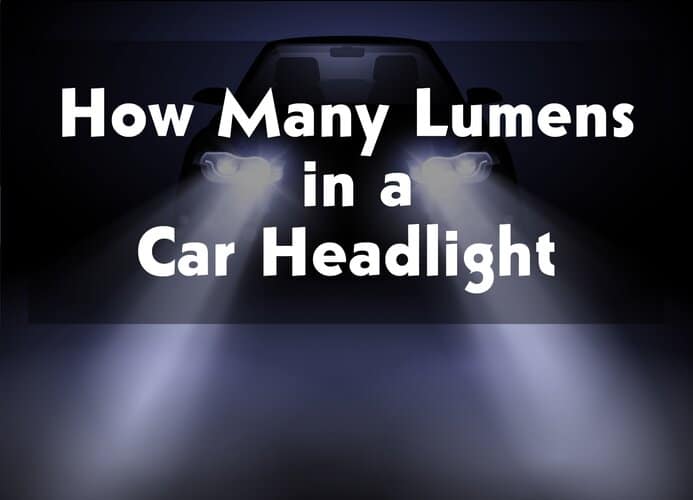Lumens are the principle of measurement of the brightness of any bulb.
The average brightness, or how much light a bulb (be it a lamp or a headlight) produces, the lumens decide it.
The unit lumens is derived from the physics term luminous flux, but since we’re not taking a physics class today- let us introduce you to the significance of How Many lumens in a car headlight.
Lumens on a car headlight depend upon the type of light usually a car headlight has 16-170 lumens.
What is a Lumen?
As aforementioned, lumens are the determinant of a bulb.
And the relationship between the brightness of a bulb (i.e., car headlights) and lumens is proportional.
In easy terms, you may have noticed that LED headlights produce a brighter light than halogen ones.
And that’s what makes all the difference.
It simply implies that LEDs have a higher lumen value, whereas halogens have a comparatively lower value.
So, if you want that glow and spark on the road and a better vision on the highway corners, you need an excellent lumen-valued headlight.

How Lumen Values on Car Headlights?
It’s not just about the brightness, but there are these sneaky little details that make the lumen values for any car headlights far more significant than they might seem.
After being fed with all this information, you might wonder if higher lumens are the best choice, and yes, it is.
But you have to compromise a bit on the running hours of the headlights, too-as they will have to work out a lot!
There’s another misconception that lumens and Kelvin’s values of car headlights might be the same. Well, they are not!
They are just two different properties of the light generated.
The first property indicates the brightness, while the other determines the temperature while generating that amount of light.
And last but not least, high beam headlights have a higher lumen value (almost 1400), and the low beams can range up to 1375, which is a lower lumen value.
Average Lumens in a Car Headlight Can Be Found
You should know that different headlights generate different amounts of lumens by this time.
But the average value, if we take any headlight, then per se, we can expect a value of 1000-2500 on average.
But in some cases, the lumen value is not the only cause, and some factors revolve around it.
For example, the color temperature or the number of bulbs to complete an entire assembly of the headlight.
Light is the crucial part of car headlights, hence the property that determines the light output, lumens.
And it is always recommended not to look at the watts value when buying a set of car headlights, rather keep an eye on the average lumen output.
Not necessarily more watts mean more efficiency.
Different Types of Car Headlights and Average Lumens
There are four types of headlights: halogen, LED, xenon, and laser, and two types of headlight systems, reflector, and projector, decide what kind of process the headlights should do to generate light.
First, we’ll be going through a descriptive model of all four headlights, and finally, there will be a quick chart for a more detailed view.
So, keep these things in mind before you are illuminated, the number of bulbs required and also that there are high beam headlights and low beam headlights.
High beams focus on most of the road, and low beams concentrate on objects more towards the surface.
01. Halogen
The value starts from around 700 lumens and ends in 1250 or so.
The range is based on the lumen output of low beams and high beams.
Not to mention that low beams have low lumen outputs and high beams have a higher value.
Parting from that, we told you to keep the note of assembly in consideration.
The number of bulbs may differ, and so can the type of only high beams or only low beams.
For example, if you choose only high beams, the number of bulbs will be higher than a standard set.
Consequently, the number of lumen values will reach around 2000.
02. LED
LEDs are the most popular choice among drivers because they come at reasonable prices and provide satisfactory results.
The average lumens value lies between 2500-4000.
Here two things should be kept in mind: the number of bulbs and wattages.
So, when you see a package of LED headlight bulbs with a colossal number of wattages, you can confirm if the manufacturer is not selling lies.
Typically 1 watt entertains 120 or so lumens.
03. Xenon (HID)
HID bulbs have a growing body of acceptance amongst high-end product users.
It is brighter than regular bulbs (3000 lumens).
But like LED bulbs, wattage is a crucial factor. In this case, 1 watt generally attracts 80 lumens.
Interestingly, the brightest you can get in terms of HID bulbs is 5000 lumens.
04. Laser
This is the brightest sparker you can find and the most expensive of the four.
One watt means a whopping 170 lumens for this bad boy.
And laser headlight bulbs are only offered and used by BMW and Audi manufacturers.
Now it’s time for the good stuff,
Now hold up there!
We have some headlight systems to discuss, remember?
Projector headlights act like standard projectors and are a new addition to the automobile tech world.
However, the science behind it is easy.
Using the basic concept of a reflector system that takes the help of mirrors, the projector system snaps on a lens to amplify the brightness.
As a result, the brightness level and the non-blinding quality are higher in projector headlight systems, which is a total win, at least in terms of lumen outputs.
Do Lumen Values Drop Over a Bulb’s Lifetime?
Losing the intensity of any bulb is a natural phenomenon.
And since the indicator of a light’s brightness is lumen output, we can say that lumen output decreases over time.
Several factors are behind its works and some basic properties of illumination physics.
You can skip to the next part if you are not interested in science, but in-depth knowledge always serves in the long run.
In any basic lighting system, a light loss factor (LLF) is applied that is initially set above the target output, and as time passes, the multiplier factor goes down the curve.
Fortunately, you can be the master of its sea, which implies that you can change that curve. How?
Yes, this is the reward of science!
Here are some maintenance tips for making the lumen output last longer.
- Use the right type of headlights and make the correct fitment options (screws, nuts, bolts). Don’t forget to keep an eye on the alignment too.
- If you get one flickering and one perfect, change the whole set.
- Investigate the oxidizing phenomena, namely yellowing and clouding. This mainly occurs when headlights are exposed to way too much UV-so clean any dirt you see piling up.
How To Find Out How Many Lumens Does a Car Headlight Produce?
Okay, class, time for some Math!
If you want your car to glow up that road (Hopefully not blinding others!), you need to know how to calculate the lumens so that you can implement the correct value in your car.
Also, remember the previous chart?
If you know the wattages of the headlights, you can just use the simple conversion tricks.
Note that, in this chart, we used the values used by most of the sellers out there, but you can expect fluctuations too.
Frequently Asked Questions
Why Are The Headlights Not Bright Enough?
Understandably, you bought the best product out there, and it just doesn’t work out as you planned it to.
Here are some steps to check up on your headlights if they are not obedient.
- Are they dim or not? Check if they are functioning well.
- Check if the aim/alignment is proper.
- Don’t forget the lenses, too!
- If you try to find out the reason behind a dimmed one, it’s mainly because of corroded ground wire.
- Some also face the issue that headlights seem to generate more light when the car is at high speed; well, if that’s the case, check the alternator.
- Finally, sometimes you might seem that everything is okay, yet the lights on the lower beams are no longer responding. The chances are that the relay that distributes the electricity in the two types of beams is only sent to the higher beam and not the other one.
And just like that, you learned more awesome tips to make the relationship between you and your headlights work out!
For What Values of Lumens Are They Considered Illegal/Unsafe?
Well, too much bright light is not beneficial in some aspects.
When you drive, you have to think about not emphasizing your safety but others outside the car.
For these valid reasons, particular lumen values or brightness levels are illegal.
It varies from state to state or from country to country.
First, let’s know the highest value accepted by the system is Ring Xenon150.
And to be frank, there are no specific limits that will act like a total law for the global part.
But it’s considered that any value over 2600 is deemed to be dangerous for both parties inside and outside the car.
Yes, it is vague; still, make sure it is not ‘too bright.’
Which Headlight Type is Better in Terms of Lumen Output?
It is clear from the charts that a laser is the best option.
But the bad news is, it’s still not ubiquitous and not for all brands or models of cars.
So, what is our next choice?
Let’s go through the elimination process. The first is halogen.
It’s cheap and chic, but not bright enough. Therefore, eliminated!
The last two options with which we left are LED and HID.
They have almost similar pros and cons.
They are both very bright compared to the halogen option but also require a lot of extra parts for successful light illumination.
The thing that sets them apart is the headlight system.
So, it’s totally up to you because LEDs are the best option for reflector systems, whereas HIDs produce the most light when accompanied by projector systems.
Final Thoughts
Indeed, the importance of luminance needs a no-brainer.
And there are a lot of factors related to it and many factors that can be derived from it, and we hope we have covered every relevant topic and believe this article will benefit.
Indeed, a little bit of graphic visualization named YouTube videos will help you clear some clouds!

Hello! My name is John Smith. I’m the creator of this website. Since childhood, I had a passion for cars and its mechanisms. So, I started working in the automotive industry when I just left school, and how I have over 10 years of experience in this industry. To make my experience alive through the content I started blogging through Lighting Sparkle. I hope that my experience through the content can help you a lot in making decisions and learning.

